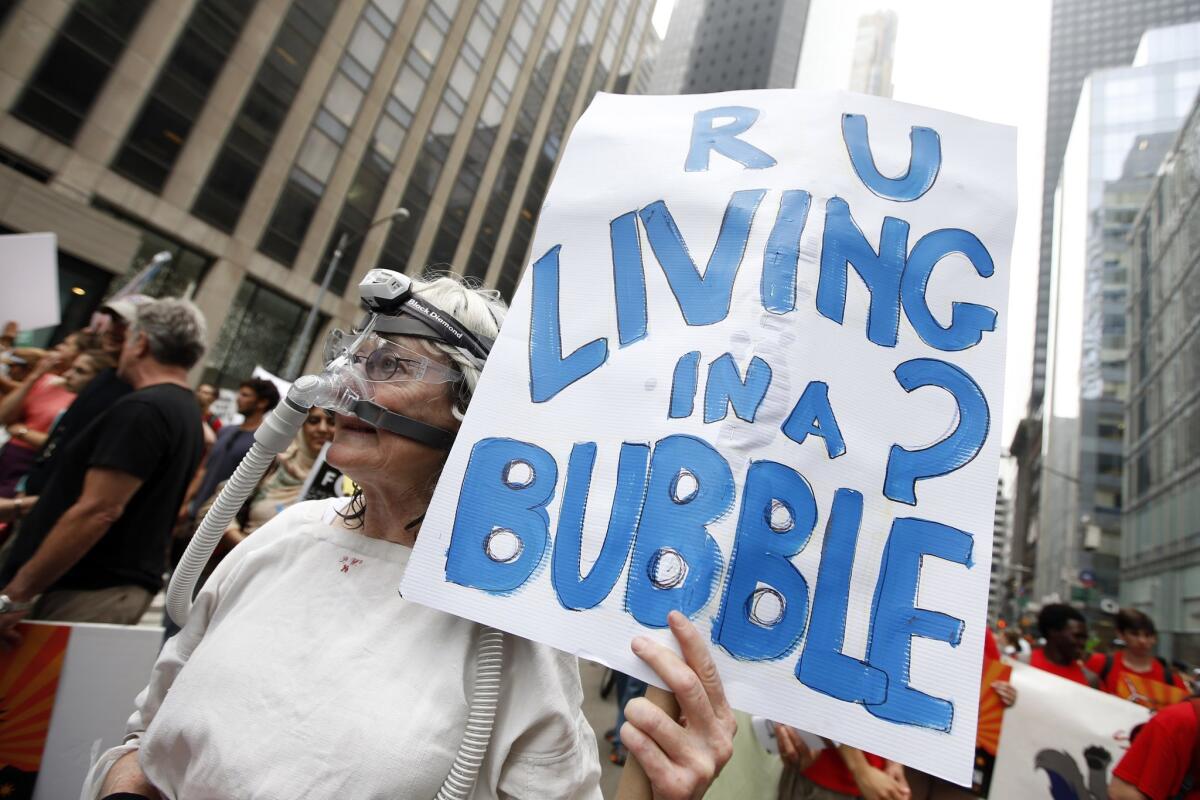Op-Ed: Bill McKibben: What the Paris conference on climate change can do for planet Earth

Demonstrators make their way down Sixth Avenue in New York during the People’s Climate March on Sept. 21, 2014.
Starting Monday, diplomats and scientists, activists and heads of state at the 2015 U.N. climate change conference in Paris will scramble to reach the first truly global agreement on the greatest problem the planet has ever faced. It will make for compelling headlines, but it’s not the real story. Because that already happened.
Think back to Copenhagen in 2009 and the last of the great U.N. climate gatherings. There too the world watched expectantly, only to see negotiations break down. No firm targets, timetables or enforcement mechanisms for cutting carbon emissions were put into place. Copenhagen failed because no real pressure was put on the world’s leaders to make a deal. President Obama and Secretary of State Hillary Clinton — and other national leaders — could come home empty-handed and pay almost no political price. It was easier to disappoint a nascent climate movement than it was to stand up to the fossil fuel industry.
The Paris climate conference represents a possible turning point in the fight between the fossil fuel industry and the rest of us.
In the six years since, the power equation has changed, and that’s the real story of the Paris conference.
The shift was clear in New York last fall, when 300,000 to 400,000 people marched through the streets demanding action on global warming, the largest demonstration in this country in years. Two days later, Obama told the United Nations: “Our citizens keep marching. We cannot pretend we do not hear them. We have to answer the call.”
And a few weeks after that, the United States and China announced a joint pledge to meet specific emissions goals, a first for China and an increased commitment from the U.S. That agreement from the world’s largest greenhouse gas emitters has helped push other nations into the fold in Paris.
There have been other victories as well: Obama’s rejection of the Keystone XL pipeline, New York state’s ban on fracking, Shell’s retreat from Arctic drilling. In Australia, plans for the world’s largest coal mines have been blocked. Australian Prime Minister Tony Abbott and Canada’s Prime Minister Stephen Harper, the Western world’s most outspoken advocates for increased carbon extraction, lost their jobs in recent elections. Exxon Mobil, the world’s most powerful fossil fuel company, is in the dock for climate deceit that was exposed by the Los Angeles Times, Columbia University’s Energy & Environmental Reporting Project and Inside Climate News.
A resurgent environmental movement isn’t the only thing that’s changed since Copenhagen. Engineers, scientists and technologists have played their part. The price of a solar panel had dropped 80% since 2009. Wind power is now so efficient that countries such as Denmark can supply their power needs from the breeze on many days and send a surplus into the European grid. In the developing world, it’s possible to skip the coal age in favor of clean energy. China will use less coal this year than last, and it’s building renewable energy infrastructure at a breakneck pace.
If the coal, gas and oil industries no longer enjoy a chokehold on the outcome of climate talks, their power hasn’t disappeared. There will be no formal treaty in Paris; everyone knows there aren’t enough votes in the Senate to ratify an international treaty based on a rational climate policy. But neither will Paris be a failure: The pledges that governments plan to finalize there should suffice to hold warming to 3 or 3.5 degrees Celsius over the course of the century. Right now, the planet is heading for a 5-degree increase, so that’s an improvement.
Still, even 3 degrees means Earth is on a path to destruction. There is wide agreement that any temperature increase greater than 2 degrees Celsius threatens civilization; we passed the 1-degree mark this fall and already the Arctic is melting, the West is confronting epic drought and the ocean is 30% more acidic.
All of this means that Paris should be both a scoreboard and a springboard. It will show how far we’ve come, and it could launch more progress. Two issues in the negotiations will signal how much more. First, how much aid will go to the poorest nations to help them leapfrog the fossil fuel age and deal with the effects of global warming that are now unavoidable. It will take real money — ongoing, steady support — to substitute alternative energy sources for coal in the developing world. Republicans aren’t helping here: 11 days ago , they voted down even $500 million in funding from the United States, one of many explicit efforts to torpedo the negotiations.
The second clue is whether the conference will set a clear goal for not just reducing but ending the use of fossil fuels. Will it establish an efficient way to ratchet up emission pledges, as science and technology evolve? Having wasted the last quarter-century, the world can’t afford to keep gearing up for once-a-decade grand gatherings; it needs to move smoothly forward into a 100% renewable energy future.
The Paris climate conference represents a possible turning point in the fight between the fossil fuel industry and the rest of us, but the great murky unknown remains: How much of a margin do physics and chemistry allow a warming Earth? The recent news that October was the hottest month ever recorded on our planet, and that the atmosphere’s CO2 level has topped 400 parts per million, sobers any optimism.
Whatever happens in the next two weeks, it almost certainly won’t be sufficient. Physics and chemistry don’t negotiate. After Paris, we will have to maintain the pressure on our leaders, and hope for a bit of luck.
Bill McKibben is the founder of the global climate campaign 350.org and a professor of environmental studies at Middlebury College.
Follow the Opinion section on Twitter @latimesopinion and Facebook
ALSO
Democrats could learn from Jimmy Carter’s public religiosity
The solution to storing San Onofre’s spent nuclear fuel
Prioritizing fighting terrorism over climate change is a no-win scenario
More to Read
A cure for the common opinion
Get thought-provoking perspectives with our weekly newsletter.
You may occasionally receive promotional content from the Los Angeles Times.










